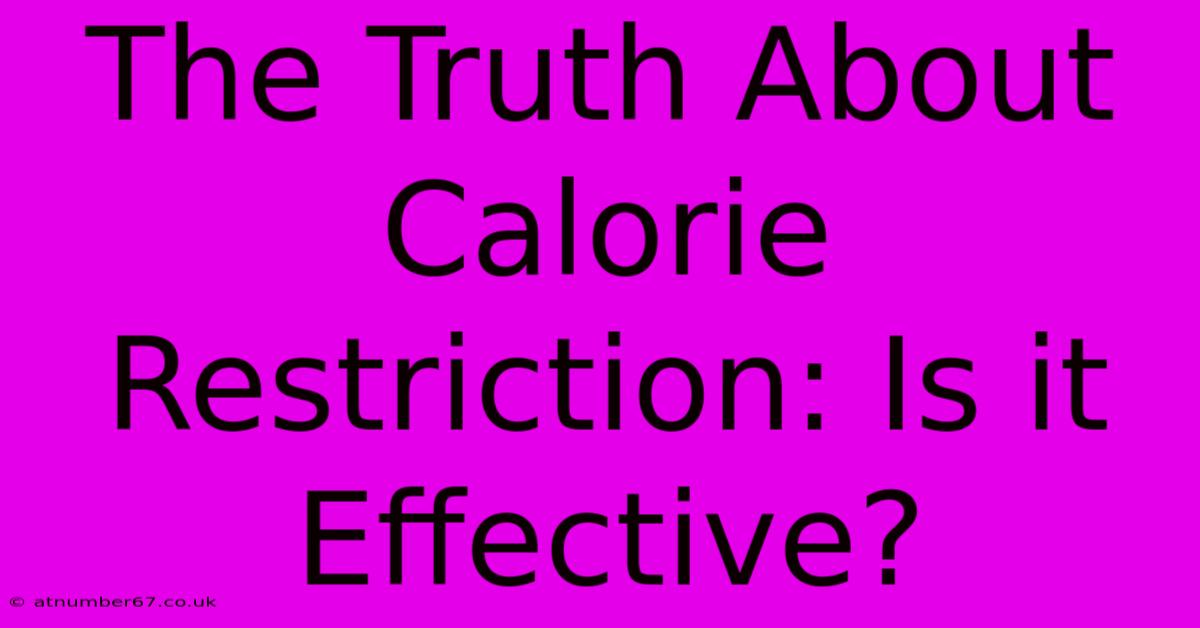The Truth About Calorie Restriction: Is It Effective?

Table of Contents
The Truth About Calorie Restriction: Is it Effective?
Calorie restriction, the practice of consuming fewer calories than your body burns, has long been touted as a cornerstone of weight loss. But is it truly effective, and more importantly, is it sustainable and healthy in the long run? Let's delve into the truth behind this popular dieting strategy.
Understanding Calorie Restriction
At its core, calorie restriction is simple: consume fewer calories than you expend. This creates a calorie deficit, forcing your body to tap into stored fat for energy, resulting in weight loss. The effectiveness of this method is largely undisputed in the short term. Many studies have demonstrated a clear link between reduced calorie intake and weight loss.
Types of Calorie Restriction
There are different approaches to calorie restriction:
- Moderate Calorie Restriction: This involves reducing your daily calorie intake by a moderate amount (e.g., 500-750 calories). This is generally considered a safer and more sustainable approach.
- Severe Calorie Restriction: This involves significantly reducing your calorie intake (e.g., drastically below your body's needs). This method can be dangerous and lead to various health complications.
- Intermittent Fasting: This isn't technically a form of calorie restriction but it achieves a similar effect by cycling between periods of eating and voluntary fasting. It's become increasingly popular as a way to manage calorie intake.
The Effectiveness of Calorie Restriction: Benefits and Drawbacks
While calorie restriction can lead to weight loss, it's crucial to understand both its benefits and drawbacks:
Benefits:
- Weight Loss: The primary benefit is, undoubtedly, weight loss. A consistent calorie deficit will lead to fat loss over time.
- Improved Metabolic Health: Studies show that calorie restriction can improve markers of metabolic health, such as insulin sensitivity and blood pressure.
- Potential Longevity Benefits: Some research suggests that moderate calorie restriction may extend lifespan in certain organisms, although the evidence in humans is still limited.
Drawbacks:
- Hunger and Cravings: Reducing calorie intake inevitably leads to increased hunger and cravings, making it difficult to adhere to long-term.
- Nutrient Deficiencies: Restrictive diets often lack essential nutrients, potentially leading to health problems.
- Muscle Loss: Severe calorie restriction can lead to muscle loss, slowing metabolism and making it harder to maintain weight loss.
- Metabolic Slowdown: The body can adapt to reduced calorie intake by slowing down its metabolism, making further weight loss more challenging.
- Potential Psychological Effects: Strict calorie restriction can negatively impact mood, energy levels, and overall mental well-being.
Is Calorie Restriction Sustainable?
The long-term sustainability of calorie restriction is arguably its biggest challenge. While it may yield quick results, maintaining a significant calorie deficit for extended periods is extremely difficult for most people. The constant hunger, cravings, and potential negative psychological effects often lead to diet abandonment and weight regain.
A More Holistic Approach to Weight Management
Rather than focusing solely on calorie restriction, a more sustainable and healthy approach to weight management involves:
- Balanced Diet: Emphasize whole, unprocessed foods, including fruits, vegetables, lean protein, and whole grains.
- Regular Exercise: Combine calorie restriction with regular physical activity for optimal weight loss and health benefits.
- Mindful Eating: Pay attention to your hunger and fullness cues, and avoid emotional eating.
- Professional Guidance: Consult a registered dietitian or healthcare professional for personalized guidance and support.
Conclusion: Calorie Restriction – A Tool, Not a Solution
Calorie restriction can be an effective tool for weight loss in the short term, but it shouldn't be viewed as a long-term solution. A balanced approach that combines moderate calorie restriction with a healthy diet, regular exercise, and mindful eating practices is far more sustainable and effective for achieving and maintaining a healthy weight. Remember to prioritize your overall well-being and consult with a healthcare professional before making significant dietary changes. The key is to find a sustainable lifestyle that supports your health goals without sacrificing your mental and physical well-being.

Thank you for visiting our website wich cover about The Truth About Calorie Restriction: Is It Effective?. We hope the information provided has been useful to you. Feel free to contact us if you have any questions or need further assistance. See you next time and dont miss to bookmark.
Featured Posts
-
Den Ses Pa Son Building A Healthy Relationship
Apr 02, 2025
-
Mom Salary Comparison Expert Advice For Moms
Apr 02, 2025
-
Prince Valiants Son The End Of An Era
Apr 02, 2025
-
Unveiling The Truth Behind Garggi Ananthans Age
Apr 02, 2025
-
Kai Watts The Teenager Taking Hollywood By Storm
Apr 02, 2025
